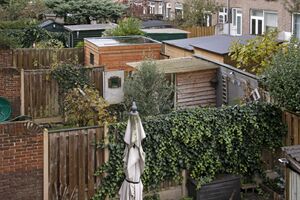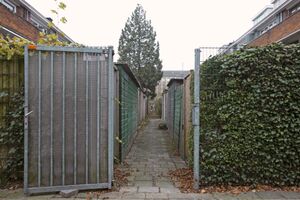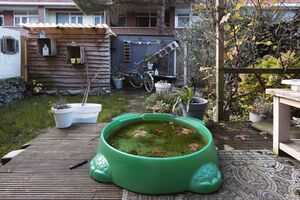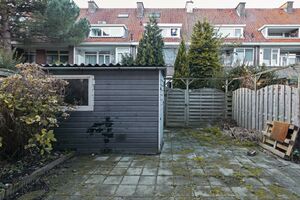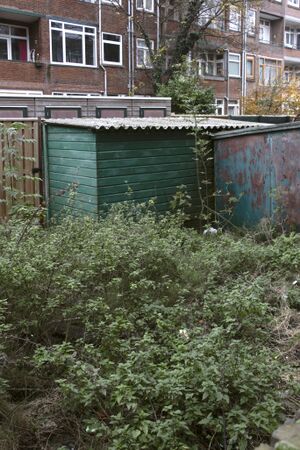Marusa-thesis outline: Difference between revisions
No edit summary |
No edit summary |
||
| (14 intermediate revisions by the same user not shown) | |||
| Line 1: | Line 1: | ||
Who are my neighbours? | |||
'''GARDENS'''<br> | |||
My project proposal goes along with the thesis hand in hand, so the two of them form each other. <br> | |||
Who are my neighbours?<br> | |||
<br> | |||
'''Keywords:''' neighbours, gardens, private, public space, nature | |||
<br> | |||
'''Writing style:''' storytelling, observation records, overalls from research | |||
<br> | |||
<br> | |||
Gardens are a quick escape to nature and can help you to change an environment rapidly within the greyness of the city. In the country of Slovenia, where I come from, the garden is an important part of living space. Slovenian gardens strive for the fullness of greenery, they usually have space for an outdoor table for warmer days and a part of the garden that is intended for growing home-grown vegetables and fruits. | |||
<br> | |||
Me and my family have a big connection and engagement to our garden in Slovenia. Different seasons brings different activities and taking care of. In autumn we cut trees and bushes, in winter it becomes a snow city for the children, spring is a season when the whole family to harvest grown fruit and vegetable and in summer we take every opportunity to spend outside and have garden parties. | |||
<br> | |||
I moved to Rotterdam in September 2020. I live in a multi-apartment house in Oud-Charlois, of which the apartments face the central space. The apartments on the ground floor have their own gardens, as it is quite common for residential buildings in Dutch urbanism. We live in an apartment with no garden, but have a great view on some of them. | |||
As the garden is a very important part of my life, having no garden is a big cut of. Observing happenings on Dutch gardens and their characters, the comparison to Slovenian customs is quite different. | |||
<br> | |||
Gardens are a specific space of living environment and their state depends on weather, skills and engagement of the residents. I will be researching people's relation to gardens and the connection to nature in the Netherlands, for a deeper understanding of the culture. | |||
The research will help me to get to know more people and make me feel more part of a community. | |||
<br> | |||
<br> | |||
'''Approach:''' | |||
I will visit people’s homes and interview them about gardens. The questions will vary whether they have a garden or not. After the interview I will take photographs of the gardens and juxtapose them next to each other, so I will have a good overview of them all. With the analysis of the interviews and the overview and reading of photographs I will be able to make out a better understanding of how the spaces are being used. | |||
<br> | |||
In addition to the gardens inside our building, I will also visit some common gardens around Rotterdam, where a group of people led by 5-6 organizers cultivate and arrange the rented space or donated space from the municipality. I will also inquire about the municipal effort to create a greener city | |||
<br> | |||
<br> | |||
[[File:Vrt.jpg|frameless|none]] | |||
<br> | <br> | ||
[[File:Vrt2.jpg|frameless|none]] | |||
<br> | <br> | ||
[[File:Vrt3.jpg|frameless|none]] | |||
<br> | |||
[[File:Vrt4.jpg|frameless|none]] | |||
<br> | |||
[[File:Vrt5.jpg|frameless|none]] | |||
<br> | <br> | ||
There are 84 apartments, of which 42 are ground floors with gardens. | There are 84 apartments, of which 42 are ground floors with gardens. | ||
<br> | |||
I don’t count on everyone to participate. | I don’t count on everyone to participate. | ||
<br> | |||
If they have a garden: | If they have a garden: | ||
<br> | |||
What does a garden mean to you? | |||
<br> | |||
What are you using it for? | What are you using it for? | ||
<br> | |||
How often do you use it? | How often do you use it? | ||
<br> | |||
When you use your garden, do you feel being watched? How does that infect you? | |||
<br> | |||
What would your ideal garden look like? | |||
<br> | |||
Do you use a shed? | Do you use a shed? | ||
<br> | |||
When buying an apartment, did you specifically look for an apartment with a garden? | When buying an apartment, did you specifically look for an apartment with a garden? | ||
<br> | |||
What do you think about the idea of a common space / garden? | What do you think about the idea of a common space / garden? | ||
<br> | |||
Do you know your neighbors? | Do you know your neighbors? | ||
<br> | |||
How often do you go out of the city with a purpose of visiting nature? | |||
<br> | |||
If they do not have a garden: | If they do not have a garden: | ||
Would you like to it? | |||
<br> | |||
What does a garden mean to you? | |||
<br> | |||
Would you like to have it? | |||
<br> | |||
What would you use it for? | What would you use it for? | ||
<br> | |||
Do you use a shed? | Do you use a shed? | ||
<br> | |||
What would your ideal garden look like? | |||
<br> | |||
What do you think about these gardens? | What do you think about these gardens? | ||
<br> | |||
If you could, would you change anything? | If you could, would you change anything? | ||
<br> | |||
Do you use a balcony and for what? | Do you use a balcony and for what? | ||
<br> | |||
What do you think about the idea of a common space / garden? | What do you think about the idea of a common space / garden? | ||
<br> | |||
Do you know your neighbors? | Do you know your neighbors? | ||
<br> | |||
How often do you go out of the city with a purpose of visiting nature? | |||
<br> | |||
<br> | |||
I want to talk to people and remind them the importance of gardens, and how can that specific space affect persons life. In order to make my life feel more like home in a home with no garden, the solution would be to have a view on gardens, filled with plants and green. Not that I am expecting that the talks will make a significant change, but I am interested in other peoples perspective. | |||
<br> | |||
<br> | |||
'''TIMETABLE''' | |||
<br> | |||
30 more interviews of people from my building, and other neighbourhoods | |||
<br> | |||
Analysis of the interviews and reads of photographs that i will have | |||
<br> | |||
Further investigation – visiting communal gardens, Christmas street decorating | |||
<br> | |||
More interviews following month | |||
<br> | |||
In January i am going to Slovenia for a week, try to get as much interviews and photographs as possible | |||
<br> | |||
Comparisson of both | |||
-further investigation | |||
<br> | |||
• 19 November - Thesis Outline Deadline | |||
<br> | |||
• 3 Dec – First draft Chapter | |||
<br> | |||
• 18 Feb - Deadline First Draft Thesis | |||
<br> | |||
• 18 March - Deadline Second Draft thesis (texts to 2nd readers) | |||
<br> | |||
• 1 April - Deadlines Second readers' comments | |||
<br> | |||
• 14 April - DEADLINE THESIS | |||
<br> | |||
• | |||
<br> | |||
INTRODUCTION - abstract | |||
<br> | |||
CHAPTER 1 (2000 words) – how i got to the theme, what does a space of garden evoke in me, introduction of my own fascination, experience and habbits from slovenia | |||
<br> | |||
CHAPTER 2 (2000 words) – other peoples perspectives, the interviews and their analysis, Gemeente Rotterdam dealing with gardens, embracing – what did they succeed so far | |||
<br> | |||
CHAPTER 3 (2000 words) - | |||
<br> | |||
CONCLUSION | |||
<br> | |||
<br> | |||
CHAPTER 1 (2000 words) – how i got to the theme, what does a space of garden evoke in me, introduction of my own fascination, experience and habbits from slovenia | |||
<br> | |||
- View on gardens from balcony | |||
<br> | |||
- Getting to know the neighbours only through their actions, habbits, use of gardens – my own representation | |||
<br> | |||
- Space we all are a part of as viewers, but very limited in use – communal view, no contact – publicly private / privatly public | |||
<br> | |||
- My garden in slo – activity, use, plants | |||
<br> | |||
- Got to know my neighbours over fences on gardens | |||
<br> | |||
- Other gardens, Community gardens in Slo | |||
<br> | |||
<br> | |||
<br> | |||
<br> | |||
<br> | |||
( | === reference, research docs === | ||
<br> | |||
'''Gemeente Rotterdam''' | |||
<br> | |||
The municipality also offers a cash prize for anyone who collects rainwater in cubic meters, adds greenery and thus helps reduce the amount of water during storms and rain in groundwater | |||
<br> | |||
https://www.rotterdam.nl/wonen-leven/subsidie-klimaatadaptatie/ | |||
<br> | |||
Since 1 January 2020, residents of Rotterdam can apply for a subsidy for the construction of more greenery and the collection of rainwater. The municipality wants to arm the city against the consequences of extremely dry and wet weather. | |||
Greening gardens or (roof) terraces. Disconnect the downspout from the sewer. Collecting and (re)using rainwater. Rotterdam homeowners, companies, associations and foundations can use the subsidy for this from next year. And that is necessary, because the municipality cannot do everything itself. 'Only 40% of city land is owned by the municipality. With the subsidy we can jointly ensure a city that can withstand the increasingly common extreme dry and wet weather conditions', explains alderman Bert Wijbenga. | |||
Less flooding | |||
<br> | |||
Extra greenery and the collection of rainwater are important. The more rainwater is collected during heavy showers, the less flooding and water damage to buildings. In addition, the sewer is less likely to be overloaded during a downpour. And 'green' also absorbs water well and retains less heat in hot summer weather. | |||
<br> | |||
Grant amount | |||
<br> | |||
• 500 euros per added cubic meter of water storage | |||
<br> | |||
• 5 euros per added square meter of disconnected surface | |||
<br> | |||
• 10 euros per added square meter of green area | |||
<br> | |||
https://www.rotterdam.nl/wonen-leven/groene-tuin/ | |||
<br> | |||
<br> | |||
'''Fasade garden time!''' | |||
<br> | |||
https://rotterdammakeithappen.nl/en/rotterdam-zet-door/a-thousand-facade-gardens-in-rotterdam/ | |||
<br> | |||
‘In bold capitals: TIME FOR A FACADE GARDEN! With a few photos of people sitting next to plants outside their front doors. And the text: “Would you like to be sitting here next summer? Then it’s now high time to get started. While working from home, you can easily set aside an hour for the work.” There were a lot of reactions. Thirty facade gardens have been created since then.’ | |||
<br> | |||
'''Mary beth Pudup, IT TAKES A GARDEN:''' Cultivating citizen – subjects in organized garden projects | |||
<br> | |||
This article advances the concept “organized garden project” over the richly connotative, but inchoate term “community garden,” and links the long episodic history of garden projects with changing discourses about the supposedly transformative power of gardening practice for individual and social transformation. | |||
<br> | |||
Using visual evidence https://web.p.ebscohost.com/ehost/detail/detail?vid=0&sid=771662d7-81b4-4eba-8ecd-f9b5e164e5d1%40redis&bdata=JkF1dGhUeXBlPWlwLGNvb2tpZSx1aWQmbGFuZz1ubCZzaXRlPWVob3N0LWxpdmUmc2NvcGU9c2l0ZQ%3d%3d#AN=466495&db=e000xww | |||
<br> | |||
'''Community food gardens in The Netherlands:''' present and future challenges | |||
file:///Users/1009630/Downloads/Final_Report_act1707.pdf | |||
<br> | |||
This report focusses on community food gardens that have existed for more than three years, to find out current conditions and what support they could use. | |||
<br> | |||
'''WHO KNOWS WHAT A DUTCH GARDEN IS?''' | |||
<br> | |||
https://www.jstor.org/stable/1587248?Search=yes&resultItemClick=true&searchText=dutch%20gardens&searchUri=%2Faction%2FdoBasicSearch%3FQuery%3Ddutch%2Bgardens%26so%3Drel&ab_segments=0%2Fbasic_search_gsv2%2Fcontrol&refreqid=fastly-default%3A4c60b9f2352f7d3a37561f09dc18ac2f | |||
<br> | |||
History of dutch gardens, their design and influence on other gardens, for instance English | |||
Latest revision as of 21:48, 1 December 2021
GARDENS
My project proposal goes along with the thesis hand in hand, so the two of them form each other.
Who are my neighbours?
Keywords: neighbours, gardens, private, public space, nature
Writing style: storytelling, observation records, overalls from research
Gardens are a quick escape to nature and can help you to change an environment rapidly within the greyness of the city. In the country of Slovenia, where I come from, the garden is an important part of living space. Slovenian gardens strive for the fullness of greenery, they usually have space for an outdoor table for warmer days and a part of the garden that is intended for growing home-grown vegetables and fruits.
Me and my family have a big connection and engagement to our garden in Slovenia. Different seasons brings different activities and taking care of. In autumn we cut trees and bushes, in winter it becomes a snow city for the children, spring is a season when the whole family to harvest grown fruit and vegetable and in summer we take every opportunity to spend outside and have garden parties.
I moved to Rotterdam in September 2020. I live in a multi-apartment house in Oud-Charlois, of which the apartments face the central space. The apartments on the ground floor have their own gardens, as it is quite common for residential buildings in Dutch urbanism. We live in an apartment with no garden, but have a great view on some of them.
As the garden is a very important part of my life, having no garden is a big cut of. Observing happenings on Dutch gardens and their characters, the comparison to Slovenian customs is quite different.
Gardens are a specific space of living environment and their state depends on weather, skills and engagement of the residents. I will be researching people's relation to gardens and the connection to nature in the Netherlands, for a deeper understanding of the culture.
The research will help me to get to know more people and make me feel more part of a community.
Approach:
I will visit people’s homes and interview them about gardens. The questions will vary whether they have a garden or not. After the interview I will take photographs of the gardens and juxtapose them next to each other, so I will have a good overview of them all. With the analysis of the interviews and the overview and reading of photographs I will be able to make out a better understanding of how the spaces are being used.
In addition to the gardens inside our building, I will also visit some common gardens around Rotterdam, where a group of people led by 5-6 organizers cultivate and arrange the rented space or donated space from the municipality. I will also inquire about the municipal effort to create a greener city
There are 84 apartments, of which 42 are ground floors with gardens.
I don’t count on everyone to participate.
If they have a garden:
What does a garden mean to you?
What are you using it for?
How often do you use it?
When you use your garden, do you feel being watched? How does that infect you?
What would your ideal garden look like?
Do you use a shed?
When buying an apartment, did you specifically look for an apartment with a garden?
What do you think about the idea of a common space / garden?
Do you know your neighbors?
How often do you go out of the city with a purpose of visiting nature?
If they do not have a garden:
What does a garden mean to you?
Would you like to have it?
What would you use it for?
Do you use a shed?
What would your ideal garden look like?
What do you think about these gardens?
If you could, would you change anything?
Do you use a balcony and for what?
What do you think about the idea of a common space / garden?
Do you know your neighbors?
How often do you go out of the city with a purpose of visiting nature?
I want to talk to people and remind them the importance of gardens, and how can that specific space affect persons life. In order to make my life feel more like home in a home with no garden, the solution would be to have a view on gardens, filled with plants and green. Not that I am expecting that the talks will make a significant change, but I am interested in other peoples perspective.
TIMETABLE
30 more interviews of people from my building, and other neighbourhoods
Analysis of the interviews and reads of photographs that i will have
Further investigation – visiting communal gardens, Christmas street decorating
More interviews following month
In January i am going to Slovenia for a week, try to get as much interviews and photographs as possible
Comparisson of both
-further investigation
• 19 November - Thesis Outline Deadline
• 3 Dec – First draft Chapter
• 18 Feb - Deadline First Draft Thesis
• 18 March - Deadline Second Draft thesis (texts to 2nd readers)
• 1 April - Deadlines Second readers' comments
• 14 April - DEADLINE THESIS
•
INTRODUCTION - abstract
CHAPTER 1 (2000 words) – how i got to the theme, what does a space of garden evoke in me, introduction of my own fascination, experience and habbits from slovenia
CHAPTER 2 (2000 words) – other peoples perspectives, the interviews and their analysis, Gemeente Rotterdam dealing with gardens, embracing – what did they succeed so far
CHAPTER 3 (2000 words) -
CONCLUSION
CHAPTER 1 (2000 words) – how i got to the theme, what does a space of garden evoke in me, introduction of my own fascination, experience and habbits from slovenia
- View on gardens from balcony
- Getting to know the neighbours only through their actions, habbits, use of gardens – my own representation
- Space we all are a part of as viewers, but very limited in use – communal view, no contact – publicly private / privatly public
- My garden in slo – activity, use, plants
- Got to know my neighbours over fences on gardens
- Other gardens, Community gardens in Slo
reference, research docs
Gemeente Rotterdam
The municipality also offers a cash prize for anyone who collects rainwater in cubic meters, adds greenery and thus helps reduce the amount of water during storms and rain in groundwater
https://www.rotterdam.nl/wonen-leven/subsidie-klimaatadaptatie/
Since 1 January 2020, residents of Rotterdam can apply for a subsidy for the construction of more greenery and the collection of rainwater. The municipality wants to arm the city against the consequences of extremely dry and wet weather.
Greening gardens or (roof) terraces. Disconnect the downspout from the sewer. Collecting and (re)using rainwater. Rotterdam homeowners, companies, associations and foundations can use the subsidy for this from next year. And that is necessary, because the municipality cannot do everything itself. 'Only 40% of city land is owned by the municipality. With the subsidy we can jointly ensure a city that can withstand the increasingly common extreme dry and wet weather conditions', explains alderman Bert Wijbenga.
Less flooding
Extra greenery and the collection of rainwater are important. The more rainwater is collected during heavy showers, the less flooding and water damage to buildings. In addition, the sewer is less likely to be overloaded during a downpour. And 'green' also absorbs water well and retains less heat in hot summer weather.
Grant amount
• 500 euros per added cubic meter of water storage
• 5 euros per added square meter of disconnected surface
• 10 euros per added square meter of green area
https://www.rotterdam.nl/wonen-leven/groene-tuin/
Fasade garden time!
https://rotterdammakeithappen.nl/en/rotterdam-zet-door/a-thousand-facade-gardens-in-rotterdam/
‘In bold capitals: TIME FOR A FACADE GARDEN! With a few photos of people sitting next to plants outside their front doors. And the text: “Would you like to be sitting here next summer? Then it’s now high time to get started. While working from home, you can easily set aside an hour for the work.” There were a lot of reactions. Thirty facade gardens have been created since then.’
Mary beth Pudup, IT TAKES A GARDEN: Cultivating citizen – subjects in organized garden projects
This article advances the concept “organized garden project” over the richly connotative, but inchoate term “community garden,” and links the long episodic history of garden projects with changing discourses about the supposedly transformative power of gardening practice for individual and social transformation.
Using visual evidence https://web.p.ebscohost.com/ehost/detail/detail?vid=0&sid=771662d7-81b4-4eba-8ecd-f9b5e164e5d1%40redis&bdata=JkF1dGhUeXBlPWlwLGNvb2tpZSx1aWQmbGFuZz1ubCZzaXRlPWVob3N0LWxpdmUmc2NvcGU9c2l0ZQ%3d%3d#AN=466495&db=e000xww
Community food gardens in The Netherlands: present and future challenges
file:///Users/1009630/Downloads/Final_Report_act1707.pdf
This report focusses on community food gardens that have existed for more than three years, to find out current conditions and what support they could use.
WHO KNOWS WHAT A DUTCH GARDEN IS?
https://www.jstor.org/stable/1587248?Search=yes&resultItemClick=true&searchText=dutch%20gardens&searchUri=%2Faction%2FdoBasicSearch%3FQuery%3Ddutch%2Bgardens%26so%3Drel&ab_segments=0%2Fbasic_search_gsv2%2Fcontrol&refreqid=fastly-default%3A4c60b9f2352f7d3a37561f09dc18ac2f
History of dutch gardens, their design and influence on other gardens, for instance English

